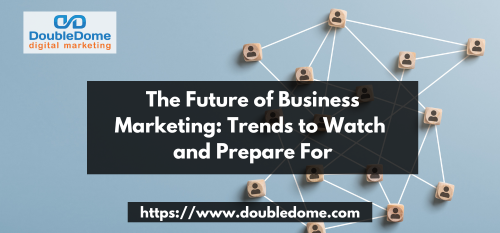By Jo Medico
The world of business marketing is constantly evolving. What worked yesterday might not resonate with your audience tomorrow. To stay ahead of the curve and thrive in the ever-changing landscape, it’s crucial to understand and embrace emerging trends. This blog post dives into the future of business marketing, highlighting key trends that will shape how businesses connect with customers in 2024 and beyond.

Trend #1: The Rise of Conversational Marketing: Two-Way Engagement Takes Center Stage
Gone are the days of one-way marketing messages. In 2024, businesses will prioritize two-way communication and build relationships with customers through conversational marketing. This involves using chatbots, live chat functionalities, and social media messaging to engage with customers in real-time, answer their questions, and address their concerns.
Benefits of Conversational Marketing:
- Improved Customer Experience: Real-time conversations allow businesses to provide personalized support and information, leading to a more positive customer experience.
- Increased Lead Generation: Conversational marketing tools can help capture leads and qualify them efficiently, nurturing them through the sales funnel.
- Enhanced Brand Building: Engaging conversations foster trust and loyalty, strengthening your brand image.
Preparing for Conversational Marketing:
- Invest in Chatbots: Utilize AI-powered chatbots to answer basic questions 24/7, freeing up your team for complex inquiries.
- Train Your Team: Equip your customer service representatives with the skills needed to deliver exceptional service through conversational channels.
- Focus on Personalization: Personalize your conversations by leveraging customer data to provide relevant information and offers.
Trend #2: Marketing in the Metaverse: Entering a New Frontier
The concept of the metaverse, a virtual world where people can interact and engage, is rapidly gaining traction. Forward-thinking businesses are already exploring how to market themselves in this nascent space.
Opportunities in the Metaverse:
- Virtual Stores and Experiences: Create virtual showrooms or stores where customers can experience products in an immersive environment.
- Brand Events and Activations: Host virtual events like product launches, concerts, or workshops to connect with your audience in the metaverse.
- Virtual Influencer Marketing: Partner with virtual influencers who resonate with your target audience in the metaverse.
Challenges of Marketing in the Metaverse:
- Early Stage Development: The metaverse is still under development, and the user base is currently limited.
- Technical Expertise: Creating engaging experiences in the metaverse requires specialized skills and technical knowledge.
- Uncertain ROI: Measuring the return on investment for metaverse marketing initiatives can be challenging at this stage.
Preparing for the Metaverse:
- Stay Informed: Keep up with the latest developments in the metaverse and identify potential opportunities for your business.
- Experiment Cautiously: Consider small-scale pilots or experiments in the metaverse to test the waters and gauge user interest.
- Build Expertise: Develop internal expertise or partner with agencies specializing in metaverse marketing.
Trend #3: Leveraging AI for Personalized Marketing Experiences: The Power of Data-Driven Insights
Artificial intelligence (AI) is no longer science fiction. Businesses are increasingly using AI tools to analyze customer data, predict behavior, and personalize marketing experiences. AI can help deliver targeted content, product recommendations, and offers that resonate with individual customers on a deeper level.
Benefits of AI in Marketing:
- Hyper-Personalization: AI allows you to tailor your marketing messages, recommendations, and offerings based on individual customer preferences and past behavior.
- Predictive Marketing: AI can predict customer needs and purchase intent, enabling you to proactively reach out with relevant content at the right time.
- Automated Campaign Optimization: AI can analyze campaign performance data and automatically optimize them for better results, saving you time and resources.
Preparing for AI-Powered Marketing:
- Invest in Data Analytics Tools: Implement data analytics tools to collect, organize, and analyze customer data effectively.
- Develop an AI Strategy: Determine how AI can best be used to achieve your marketing goals and objectives.
- Prioritize Data Security: Ensure you have robust data security measures in place to protect customer information.
Trend #4: The Evolving Landscape of Influencer Marketing: Authenticity Reigns Supreme
Influencer marketing remains a powerful tool, but it’s evolving. Consumers are becoming increasingly wary of inauthentic endorsements. In 2024, authenticity is key. Brands will prioritize partnering with micro-influencers and brand advocates who genuinely connect with their audience and represent the brand values.
The Rise of Micro-Influencers:
Micro-influencers: Individuals with smaller, but highly engaged, social media followings can have a more significant impact on purchasing decisions than celebrities with millions of followers. They often have a more niche audience and establish a sense of trust and authenticity.
Focus on Brand Advocacy:
- Partnering with brand advocates – customers who genuinely love your products or services and promote them organically – can be even more impactful. These advocates offer a genuine perspective and build trust with potential customers.
Preparing for Authentic Influencer Marketing:
- Identify the Right Influencers: Look for influencers who align with your brand values, target audience, and content style. Authenticity is key, so prioritize genuine connections over massive follower counts.
- Focus on Long-Term Partnerships: Develop long-term partnerships with influencers instead of one-off campaigns. This fosters trust and allows them to organically integrate your brand into their content.
- Measure Results Beyond Engagement: Track metrics that go beyond simple engagement numbers. Analyze website traffic, coupon code usage, and sales conversions to measure the actual impact of influencer marketing campaigns.
Trend #5: Building a Sustainable Marketing Strategy: Eco-Conscious Practices
Consumers are becoming increasingly environmentally conscious. Businesses that demonstrate a commitment to sustainability in their marketing efforts will resonate with this growing segment.
Examples of Sustainable Marketing:
- Promoting Eco-Friendly Products and Services: Highlight the sustainability features and benefits of your products or services in your marketing campaigns.
- Partnering with Eco-Conscious Causes: Collaborate with environmental organizations or initiatives that align with your brand values.
- Reducing Environmental Impact of Marketing Materials: Utilize sustainable materials for printed marketing materials and prioritize digital marketing campaigns to minimize environmental footprint.
Benefits of Sustainable Marketing:
- Enhancing Brand Image: Demonstrating a commitment to sustainability fosters a positive brand image and attracts environmentally conscious customers.
- Building Customer Loyalty: Consumers appreciate brands that share their values, leading to increased customer loyalty and advocacy.
- Future-Proofing Your Business: Sustainability is becoming a business imperative. By adopting sustainable practices, you future-proof your business and ensure long-term success.
Preparing for Sustainable Marketing:
- Integrate Sustainability into Your Brand Story: Authentically weave sustainability principles into your brand narrative and marketing messages.
- Be Transparent and Honest: Avoid greenwashing (making misleading claims about sustainability). Communicate your sustainability efforts honestly and transparently.
- Measure and Track Progress: Set sustainability goals, track your progress, and report on your environmental impact to demonstrate your commitment.
Conclusion: Embracing the Future of Business Marketing
The world of business marketing is dynamic and constantly evolving. By understanding and embracing the trends discussed in this blog post, you can prepare your business for the future:
- Prioritize Two-Way Communication: Engage in real-time conversations with your customers through chatbots, live chat, and social media messaging.
- Explore the Metaverse: Be open to the potential of marketing in the metaverse, experimenting with virtual experiences and brand activations.
- Leverage AI for Personalization: Utilize AI tools to understand your customers better and deliver hyper-personalized marketing experiences.
- Focus on Authentic Influencer Marketing: Partner with micro-influencers and brand advocates who genuinely connect with your target audience.
- Embrace Sustainable Practices: Integrate sustainability considerations into your marketing strategy and communicate your commitment to the environment.
Remember, the key to success lies in continuous learning, adaptation, and a commitment to building genuine relationships with your customers. By staying ahead of the curve and embracing these future-focused trends, you can ensure your business marketing efforts continue to thrive in the years to come.








